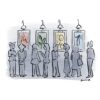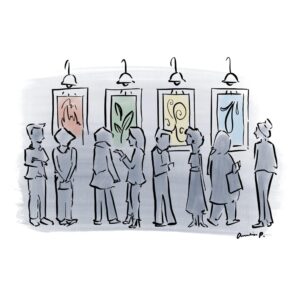Editor’s note: This story is part of a series of profiles of notable fall 2023 graduates.
As the founder and president of Nutritional Manufacturing Services (NMS) based in Chandler, Arizona, Shannon Heying is always looking for ways to become a better leader and provide the highest-quality nutritional products and solutions to her customers.
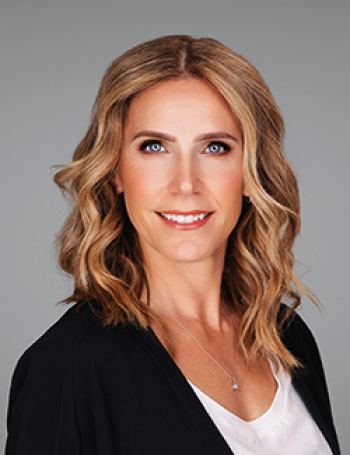
Shannon Heying
Download Full Image
Earning an Executive Master of Global Management (EMGM) at Arizona State University’s Thunderbird School of Global Management proved to be one of these ways.
“I chose Thunderbird to enhance my skills and stay competitive in the global market. Back in 2014, Thunderbird was on my radar, but its full-time schedule and Glendale location didn’t align with my business and family life. Fast forward to 2022, an email about the executive master’s degree program grabbed my attention. It promised flexibility, an enriching space for collaboration, and networking with diverse professionals, allowing me to balance education, career, and family,” the Outstanding Graduate Student said.
The deciding factor for Heying to enroll at Thunderbird? “The new modern facility at ASU’s Downtown Phoenix campus, equipped with cutting-edge technology and staffed by renowned experts, confirmed I was making the right choice.”
Heying made great use of the state-of-the-art facility and her time in the EMGM program, putting the knowledge and skills obtained to land NMS a spot in the rankings of the Top 50 Private Fastest Growing Companies by the Phoenix Business Journal and Chandler’s Top 100 by the Chandler Chamber of Commerce.
And, after graduation, she plans to continue to take her business — and her own growth — to the next level.
“My time at Thunderbird has been incredibly rewarding and transformational. I’ve encountered amazing individuals and acquired skills that have propelled me toward my personal and professional aspirations,” Heying stated.
“My primary focus post graduation is to expand my business, drawing on the valuable insights and knowledge acquired at Thunderbird. I’m committed to mentoring and empowering my team, fostering their career development while also striving for a more balanced life.”
Below, Heying elaborates on her Thunderbird journey.
Question: What do you love about being a T-bird?
Answer: Being a T-bird is something I greatly value, especially because of the people. This includes the professors and administrative staff, who are exceptional in their roles, and my cohort, a group of diverse and inspiring individuals. What’s even more remarkable is the instant welcome and sense of belonging I feel from the alumni. They create a supportive and inclusive community ready to connect, share insights and collaborate. This network of knowledgeable and open-minded people spanning the globe and various industries is invaluable. The collective wisdom, diverse perspectives and strong sense of community make being a T-bird a unique and enriching experience.
Q: What’s something you learned while at Thunderbird — in the classroom or otherwise — that surprised you or changed your perspective?
A: One of the more unexpected lessons from Thunderbird was learning more about myself, which in turn made me a more effective leader. For example, an assessment revealed my highly individualistic nature. I felt very stressed when I had my first group project and recognized the connection there. The vulnerability of not being in control during intense and challenging projects was nerve-racking. However, what I learned was that these collaborative environments, enriched by diverse backgrounds, lead to a much greater outcome. In every team, I found myself among highly intelligent individuals who excelled in areas where I had less expertise. Their support and coaching were invaluable. This experience helped me reshape my approach to leadership in my own company, fundamentally altering my approach to collaboration and reaching higher levels of entrusting others with leading important projects.
Q: Which professor taught you the most important lesson while at Thunderbird?
A: I gained so many valuable insights from some incredible professors, making it difficult to single out just one here. However, one area where I experienced significant learning was in Professor Youngdahl’s Digital Transformation course. This topic was a key reason I returned to school, as I aimed to keep my business relevant and connect with experts in the field. Professor Youngdahl’s course was particularly impactful, equipping me with the knowledge and tools to enhance efficiency and modernize my business practices. While I have grown and evolved from the lessons of all my exceptional professors, creating a better version of myself, it’s the practical and applicable lessons from this course that I find myself actively applying in my business today.
Q: What is your favorite story from your time at Thunderbird?
A: A great story from my time at Thunderbird involves a remarkable effort by one of our cohort members, Brian. Professor Ramaswamy once shared his regret about missing an opportunity to meet a certain business leader he had done a case study on that he deeply admired. Inspired by this, our classmate went above and beyond as he managed to coordinate a surprise Zoom session with this business leader, who in turn gave us an inspirational talk and shared his story. It was not just impressive in terms of the effort and coordination required, but also deeply touching to see how it moved our professor. This experience highlighted the spirit of initiative and community that defines Thunderbird.
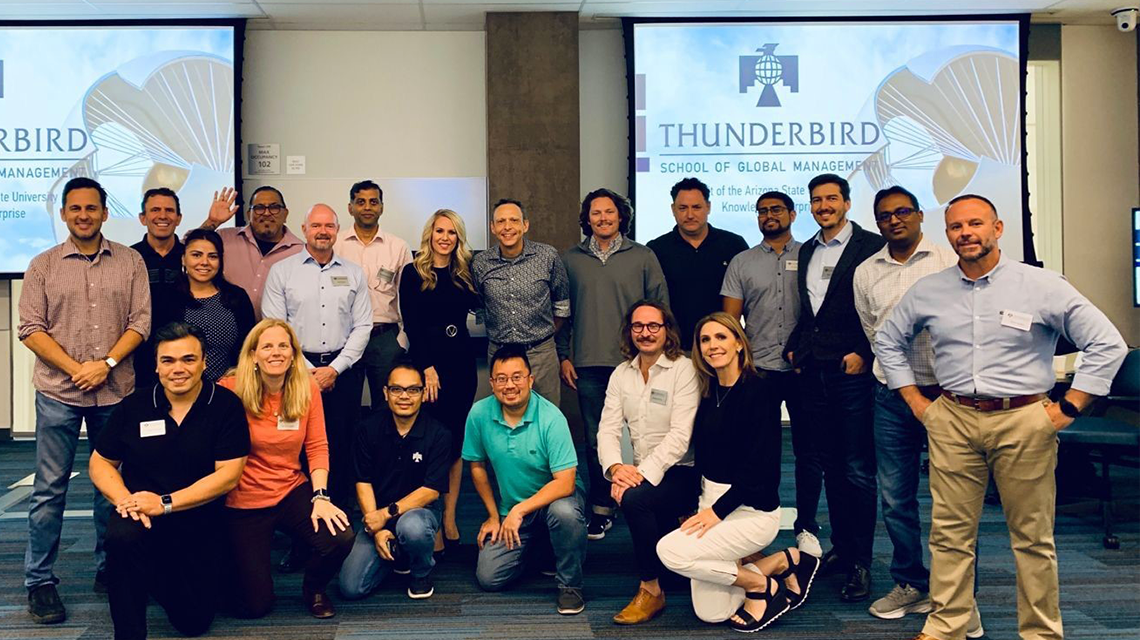
Heying smiles with her fellow E32 cohort members in TGM 530: Big Data in the Global Economy, one of the core classes of the EMGM curriculum. Courtesy photo
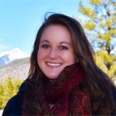
Editor’s note: This story is part of a series of profiles of notable fall 2023 graduates.
Kadison Willis took the road less traveled to Arizona State University.
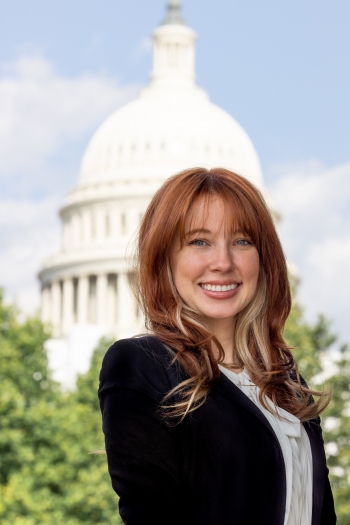
Kadison Willis took the road less traveled to ASU. Immediately after high school, the Texas native sold all of her belongings and boarded a 21-hour flight to Bangkok, several months of travel across multiple continents. But when she was struck by a debilitating mystery illness, it derailed the bachelor’s program she had started at an Australian university. She was eventually diagnosed and, with her health back under control, she was ready to finish her degree, this time with ASU Online.
Download Full Image
Immediately after high school, the Texas native sold all of her belongings and boarded a 21-hour flight to Bangkok, kicking off the adventure of a lifetime.
“Over several months, I explored Southeast Asia, Oceania, Africa and even Dubai,” she said. “Along the way, I fell in love with the east coast of Australia. I learned how to surf, which I loved, and I tried kangaroo stew, which I hated.”
When she was struck by a debilitating mystery illness, it derailed the bachelor’s program she had started at an Australian university.
After being hospitalized several times, Willis moved back to Texas in pursuit of answers. She discovered she possessed a mutated MTHFR gene, which impairs her body’s ability to filter out toxins.
By removing toxins from all aspects of her environment, Willis was able to regain her old, energetic self. Managing her lifestyle and environment also helped her discover a passion for sustainability.
With her health back under control, Willis decided she was ready to finish her degree, this time with ASU Online.
“I transferred to ASU with a major in mass communications and media studies,” she said. “After my experience with pollution and toxins, I was inspired to add a minor in sustainability. After my first class, I was hooked. I felt like my interests and experiences snapped into focus. I made the decision to turn my sustainability minor into a second degree.”
Willis continued to travel while completing her degrees. It was during the Global Intensive Experience in Belize, offered through the School of Sustainability, that she learned she’d been offered the opportunity to work as an environmental justice intern for the White House Council on Environmental Quality in Washington, D.C.
“Being in the White House opened my eyes to a world of possibilities for addressing sustainability issues,” she said. “I worked alongside some of the most intelligent and accomplished people I have ever met. I engaged in various environmental justice projects, such as background research for the Justice40 initiative and the development of the Climate and Economic Justice Screening Tool. This experience solidified my interest in working in environmental justice policy development for the federal government, a career that I hope to return to after graduate school.”
In addition to her internship in Washington, Willis found time to work for Texas state Rep. Vikki Goodwin, the National Women’s Political Caucus and the city of Austin’s Office of Sustainability.
Willis’ spirit of leadership extended to ASU’s Online Student Government where she served as director of student involvement and development and then as the elected president. Additionally, she founded the first ASU Online club for students with disabilities (Sun Devils for Accessible Education) and volunteered on the 2022 HERstory planning committee.
Currently, she is a research assistant for Mark Roseland on the Community Capital dashboard project, an interactive mapping tool that identifies environmental, social and economic indicators for communities across America.
Additionally, Willis was recently inducted into Kappa Tau Alpha, an honor society founded in 1910 to recognize academic excellence and scholarship in journalism and mass communication.
Willis is graduating with dual Bachelors of Arts in mass communications and media studies from the Walter Cronkite School of Journalism and Mass Communication and sustainability, policy and governance from the College of Global Futures’ School of Sustainability, as well as with a minor in political science.
We spoke with the new graduate to learn more about her journey with ASU Online.
Question: What’s something you learned while at ASU Online — in the classroom or otherwise — that surprised you or changed your perspective?
Answer: Growing up in the South … I was always passionate about protecting the planet, but I was raised to believe that climate change was not real. Coming to ASU and engaging with the School of Sustainability provided me with extensive data and knowledge about climate change and the effects it will have on human and animal populations, igniting in me a passion for environmental justice. Not only has this changed my perspective, but it has laid before me a career that I am excited about.
Q: Why did you choose ASU Online?
A: I chose ASU Online in the hopes that I could continue traveling, which I loved. Unfortunately, this was in 2019, so not long after, the COVID-19 pandemic hit, halting any travel plans I had.
Q: Which professor taught you the most important lesson while at ASU Online?
A: Although I’ve learned so much from my professors, the person who has taught me the most during my time at ASU is Brianne Frazier, director of student engagement and success at EdPlus. Brianne was our faculty advisor for the Online Student Government when I was serving as president. We spent countless hours on Zoom together and talked every day. She taught me so much about leadership. Getting to watch her interact with others showed me an amazing example of maintaining your strength and authority as a woman in leadership while also approaching situations with grace and kindness.
Q: What was your favorite or most meaningful course, and why?
A: My favorite course was MCO 460: Race, Gender and Media with Dr. Bramlett-Solomon (lovingly known as Dr. SBS). She is one of the most endearing and intelligent professors I’ve had the pleasure of learning from. In this course, she provided a compelling timeline of the experience of women and people of color in America, enlightening me with information I should have known long ago.
Q: What’s the best piece of advice you’d give to those still in school?
A: Take your time. If I had graduated college four years after high school, I wouldn’t have had the time to discover my love for sustainability and inevitably get a degree that I am incredibly passionate about. Our world is designed with the expectation that you will know your whole life plan by the age of 18, and truthfully, that is just not always the case. Don’t be afraid to take a deep breath, slow down and explore the things that interest you. Finishing college with something you are excited about is more valuable than how long it takes you.
Q: What was your favorite spot for power studying?
A: I love studying at Community Garden in Austin, Texas. It is a new local spot that opened on the “east side,” which is Austin’s eclectic, up-and-coming district. They make the best smiley-face acai bowls, which I am a big fan of. I like to go there for breakfast, cozy up on their big green velvet couch and study. The atmosphere feels very midcentury modern with plants everywhere and records playing in the back. It’s the perfect balance between quiet and stimulating.
Q: What are your plans after graduation?
A: I am applying to graduate school to study the intersection of politics, environment and society, either at the University of Oxford or the University of Edinburgh. After graduate school, I intend to return to broad-scale policy development and implementation for environmental justice efforts either at the White House Council on Environmental Quality or the United Nations.
Q: If someone gave you $40 million to solve one problem on our planet, what would you tackle?
A: I really believe that educating and uplifting women can solve most of the world’s problems. So, if I were given $40 million, I would put it towards educating women across the globe. The United Nations acknowledges the importance of this in their Sustainable Development Goals.
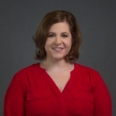
This post was originally published on this site be sure to check out more of their content

